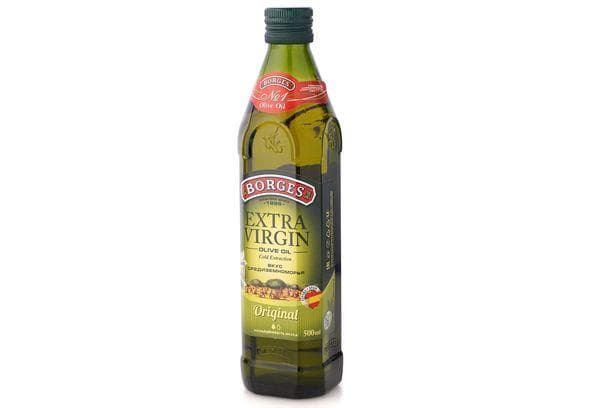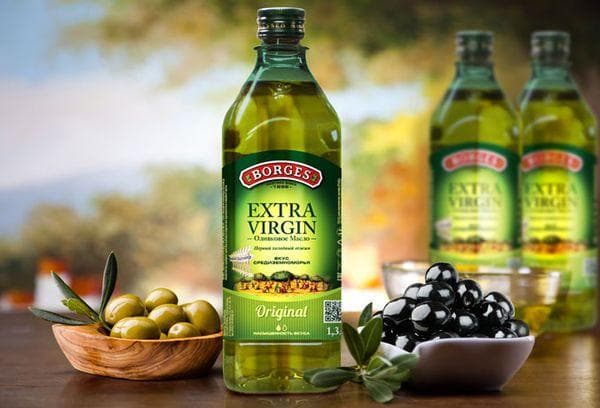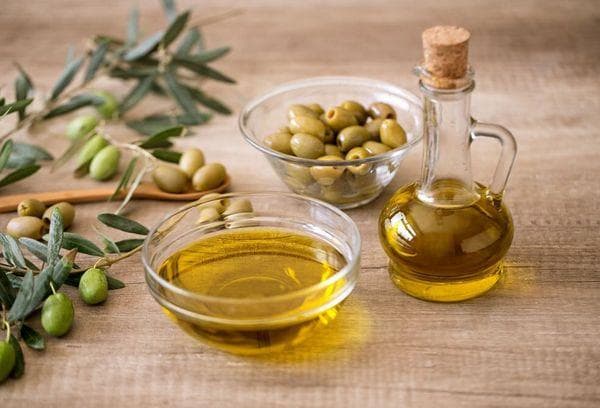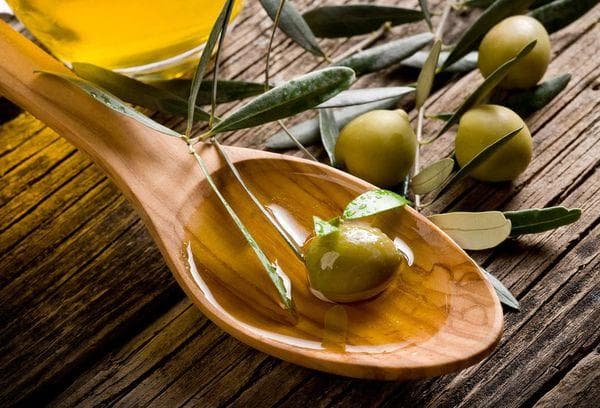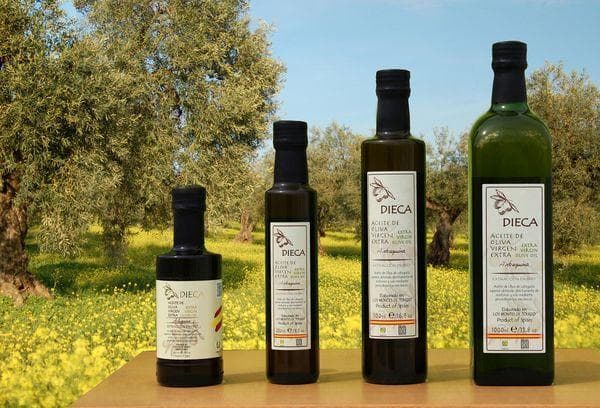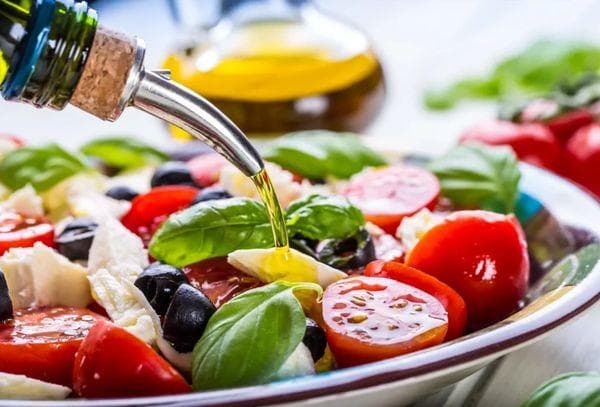What is the difference between refined and unrefined olive oil - which is better for salads and for frying?
Among healthy foods, olive oil is considered one of the most valuable. Which is better, refined or unrefined, cannot be said for sure. Both options are used in cooking, but have different uses. The unrefined product is best used for cold dishes. Refined oil is ideal for frying.
What is unrefined olive oil
Unrefined oil is a product that has not undergone additional processing; it retains the maximum amount of beneficial substances. This squeeze is completely natural and the purest. In this case, the product is divided into categories based on quality. The oil may be labeled "Extra Virgin" or "Virgin". In the first case, vegetable fat is considered to be of the highest quality.
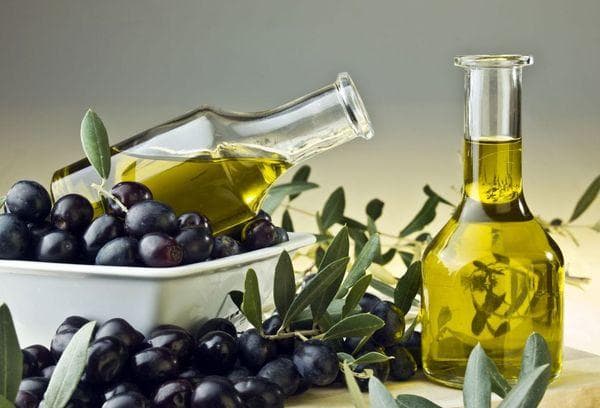
Highest quality
“Extra Virgin” oil is obtained in production from freshly picked selected olives through the first cold pressing. First, the fruits are soaked, this is necessary to remove bitterness. Then the olives are crushed and squeezed, passing through a press or centrifuge.
Chemical and biochemical additives are not used in the production of plant products in this category. After the pomace has settled for a while, it is filtered to remove any remaining pulp. At the same time, the product retains its color, smell, and taste.
All the beneficial substances remain in this oil:
- polyunsaturated fatty acids;
- phosphorus compounds (phospholipids, phosphatides);
- antioxidants;
- vitamins.
This olive oil is used not only for culinary purposes, but also for medicinal purposes. For example, they are taken orally to cleanse the liver, reduce the risk of cancer, prevent atherosclerosis and problems with the gastrointestinal tract. “Extra Virgin” is also suitable for external use, as it has wound-healing, anti-inflammatory, and softening properties. In ancient times, the product was called “liquid gold.”
Extra-class cold-pressed oil is still valued all over the world today; it is put on a par with expensive wines aged for many years. Gourmets simply pour the product into a saucepan, dip the bread in it and enjoy the taste. By the way, the organoleptic properties of the oil vary slightly depending on what type of olive was used for pressing, but it is sure to be a little bitter.
The main taste may be mixed with the taste of fruits, herbs, nuts, and tomatoes. In addition to being consumed in its pure form, the product is used for making sauces and salad dressings. Frying in such oil would be simply blasphemous. In addition, the unrefined product creates a lot of smoke when it hits a hot frying pan due to its high moisture content. The beneficial properties of Extra Virgin olive oil last for 1.5-2 years.
“Extra Virgin” oil may be labeled “Bio” or “Eco”, which indicates a special production technology, starting from the stage of growing the olives. Trees that are harvested to make an environmentally friendly product cannot be treated with chemicals. Only organic substances and natural materials are used on plantations. In Russia, such oil is expensive.A low price will indicate that the buyer is being offered a fake.
First cold press
This oil is labeled “Virgin”. Its cost is slightly lower than that of “Extra Virgin”, although both types are almost the same in their properties. The first cold-pressed product has a slightly less vibrant taste and aroma compared to that made from selected olives.
The category is assigned to the product by a special commission after tasting. If an olive oil does not score enough to be considered superior, it is classified as "Virgin". In this case, the unrefined cold-pressed product has higher acidity and may have undesirable notes in the taste.
Such a squeeze may taste slightly more bitter than a product marked “Extra”. For the average buyer, the difference will not be so noticeable. In general, the oil is of decent quality and can deservedly take a place on the kitchen shelf in any home. For example, residents of Italy and Spain save “Extra Virgin” for guests, and use regular unrefined oil for daily cooking.
What is refined olive oil
To improve some of the qualities of cold-pressed oil, technology such as refining is used. During the processing process, the product is purified from organic impurities, which allows:
- increase shelf life;
- obtain a product suitable for frying;
- eliminate components that cause allergies.
The refined product partially loses its taste and smell. Vegetable fat becomes completely flavorless if it is further deodorized.There is still ongoing debate among experts about whether such a product is useful for consumption from a medical point of view. Refined olive oil loses a significant part of its beneficial properties.
But such a product acquires some advantages over unrefined ones in the field of cooking. On the packaging of refined olive oil you can see the mark “Aceite de Oliva”. There is also a product obtained by the second pressing method, obtained from the remaining cake. Its quality is significantly lower compared to unrefined varieties. To improve the taste of such fat, manufacturers often add up to 15% oil from the premium segment to its composition.
What is the difference?
Unrefined oil is a completely natural product that has not been processed. That is why all useful substances and vitamins are preserved in it. However, in this case special storage conditions are required. The product may deteriorate due to exposure to sunlight. It is recommended to keep this type of vegetable fat in a dark glass bottle in a closed cabinet. It should not be exposed to sunlight.
The difference between “Virgin” and “Extra Virgin” is that sediment will form at the bottom of the bottle during storage. This indicates the presence of biologically active substances in vegetable fat, so this fact should not be regarded as a sign of spoilage.
Refined olive oil is obtained by refining with alkali. As a result, the taste and aroma of the product becomes weakly expressed, and some of the beneficial properties are lost. Refined fat is usually used to cook food by heating. Its neutral taste will not interrupt the taste of other ingredients.
The color of refined oil is greenish.You can easily distinguish it from unrefined one by its appearance. "Aceite de Oliva" is always absolutely transparent. The refined product can be stored in any light and temperature; it does not require specific conditions. The shade of both oils also depends on the type of olive from which the final product was produced.
comparison table
The table shows the characteristics and features of both oils. The advantages and disadvantages of each type of product are highlighted here.
| Unrefined | Refined | |
| Characteristics | Available in 2 types - “Extra Virgin” and “Virgin”. The presence of sediment and suspension is allowed. Produced by mechanical pressing. Acidity – 0.8-2°. Color – greenish-golden. The taste is rich, with bitterness. | Sold under the label "Aceite de Oliva". It has a weakly expressed taste and aroma, has a transparent consistency and a greenish color. Suitable for frying foods. |
| Advantages | The maximum amount of vitamins and biologically active substances allows the product to be used for medical and cosmetic purposes, and not just for cooking. Rich taste and bright aroma. | Widely used in cooking, richer composition compared to other vegetable oils, ability to be stored in any conditions. |
| Flaws | High price, special storage conditions, creates smoke when frying. | Lower content of valuable substances compared to unrefined varieties. Chemical processing. |
| Price | From 900 rubles per 1 liter | From 350 rubles per 1 l |
Products from the expensive segment are packaged only in glass and tin containers. Refined olive oil for frying may be sold in plastic bottles.
Pros and cons of unrefined olive oil
Unrefined olive oil is a popular product that is valued all over the world. Its advantages include:
- a large number of useful substances in the composition;
- healing properties;
- suitability for dietary nutrition.
The product is suitable for those dishes that do not require heat treatment. It is added to sauces and salad dressings. In addition, oil extract is used for cosmetic procedures. With its help you can improve the condition of your skin, hair, nails, and heal abrasions and wounds.
By taking the product in its pure form on an empty stomach, people with health problems will be able to improve the condition of the cardiovascular system and the functioning of the gastrointestinal tract. Antioxidants, which are rich in olive fruit juice, prevent aging and prevent the development of atherosclerosis and cancer. This oil is healthier than all other analogues found on store shelves (sunflower, corn, rapeseed, flaxseed).
The product has no disadvantages, except that it requires special storage conditions (dark and preferably cool place). For some, the disadvantage is the high price, which is quite justified taking into account the costs of production and transportation.
Pros and cons of refined olive oil
Refined olive oil is not used for medical purposes, but it is widely used in cooking. Its advantages:
- can be used for frying, deep-frying and homemade mayonnaise;
- does not change the taste of dishes;
- multiple use is acceptable (up to 5 times);
- has a low price.
Of course, the product is inferior to unrefined pomace in terms of the amount of valuable substances, which can be considered a disadvantage.However, if you compare it with other vegetable fats, then everything is not so bad. The technology of processing the product using chemicals may cause some concerns. Although safety standards are strictly observed, such processing is still not welcomed by adherents of a healthy lifestyle.
What is better to choose
The product obtained from olive fruits has a common basis, but slightly different areas of application depending on its properties. It is often difficult to find a replacement due to its unique features.
The use of unrefined “Extra Virgin” and “Virgin”
Unrefined vegetable oil is widely used in folk medicine. For each disease, you need to use your own recipe. Here are a few of them:
- Periodontitis. Gum disease is treated by lubricating them with a composition prepared from 1 tbsp. l. olive oil and 1 tsp. pharmaceutical tincture of celandine 3 times a day.
- Strengthening fragile blood vessels. You need to take a mixture of 1 glass of olive oil and a head of garlic passed through a press. First, the composition must be allowed to brew for 4-5 days in a dark place, and then strain. Garlic oil is consumed 1 tsp. with the addition of the same amount of lemon juice for 30 days.
- Stomach ulcer. The healing composition is prepared from 1 glass of olive oil, 1 glass of aloe juice and 1 tbsp. l. honey The mixture should sit for 48 hours. Take the drug 1 tbsp. l. half an hour before meals before each meal.
In addition, the oil will be effective in slowing down aging and preventing atherosclerosis. The product is useful for pregnant and lactating women; it is also widely used in cosmetology.
Masks based on olive squeeze help smooth out wrinkles, moisturize and nourish the epidermis, and remove inflammation on the skin. The condition of the hair improves both when the oil is taken internally and when used externally. Curls become manageable, smooth and shiny. By regularly rubbing unrefined fat into the cuticle, you can strengthen weak, flaking nails. The oil should be slightly warmed; it is recommended to add a few drops of lemon juice to it.
Use in cooking
In cooking, the unrefined product is used mainly as an additive to sauces or simply seasoned with fresh vegetable salads. It must be taken into account that oily substances and water are incompatible, so making sauces has its own tricks.
Oil is added to the liquid base in small portions. In this case, it is necessary to simultaneously beat or vigorously stir the mixture. Olive oil is also appreciated by confectioners. It improves the taste of baked goods, and during kneading it reduces the amount of gluten formed. As a result, the dough turns out fluffy and soft. Bread cooked with olive oil does not go stale longer.
Use of refined oil
Refined olive oil is better suited for frying than other vegetable fats. Being a product with high thermal stability, it practically does not penetrate deep into fish or meat and does not make them excessively fatty. When heated, olive oil increases its volume, so it is consumed economically.
The optimal frying temperature for this product is 130-180° C. When frying in this range, the products get an appetizing golden crust. The oil should not be heated to 190° C or higher, otherwise splitting processes will begin to occur.Before cooking the meat over coals, it is marinated in olive oil. Then the kebab will not be dry. Fried meat will remain juicy and absorb all the aroma of the spices.
Whatever the debate may be about the production and quality of olive oil, without a doubt, this product remains one of the most in demand. Keeping it in the house, you can feel like a real resident of the Mediterranean. The unrefined product will not only make any salad delicious, but will also provide health benefits. Refined oil will improve the taste of fried meat or vegetables and make them look appetizing.
